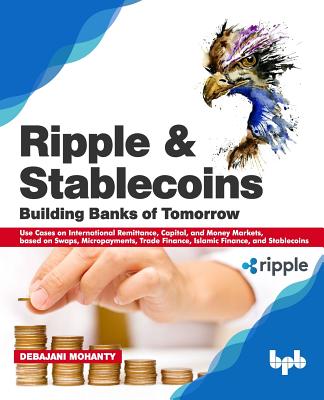The Bitcoin Standard: The Decentralized Alternative to Central Banking (Hardcover)
暫譯: 比特幣標準:去中心化的中央銀行替代方案(精裝版)
Saifedean Ammous
- 出版商: Wiley
- 出版日期: 2018-04-24
- 售價: $1,100
- 貴賓價: 9.5 折 $1,045
- 語言: 英文
- 頁數: 304
- 裝訂: Hardcover
- ISBN: 1119473861
- ISBN-13: 9781119473862
-
相關分類:
區塊鏈 Blockchain
-
相關翻譯:
比特幣標準|中央銀行的去中心化替代方案 (The Bitcoin Standard: The Decentralized Alternative to Central Banking) (繁中版)
立即出貨 (庫存=1)
買這商品的人也買了...
-
 大話設計模式
大話設計模式$620$527 -
 大話重構
大話重構$390$304 -
 精通 Python|運用簡單的套件進行現代運算 (Introducing Python: Modern Computing in Simple Packages)
精通 Python|運用簡單的套件進行現代運算 (Introducing Python: Modern Computing in Simple Packages)$780$663 -
 The Go Programming Language (Paperback)
The Go Programming Language (Paperback)$1,800$1,710 -
 Node 學習手冊, 2/e (Learning Node: Moving to the Server-Side, 2/e)
Node 學習手冊, 2/e (Learning Node: Moving to the Server-Side, 2/e)$520$442 -
 UX 從新手開始|使用者體驗的 100堂必修課 (UX for Beginners: A Crash Course in 100 Short Lessons)
UX 從新手開始|使用者體驗的 100堂必修課 (UX for Beginners: A Crash Course in 100 Short Lessons)$480$408 -
 $474區塊鏈 : 技術驅動金融
$474區塊鏈 : 技術驅動金融 -
 圖解密碼學與比特幣原理
圖解密碼學與比特幣原理$580$493 -
 $210提高轉化率!:網頁A/B測試與多變量測試實戰指南 (Experiment!Website Conversion Rate Optimization with A/B,and Multivariate Testing)
$210提高轉化率!:網頁A/B測試與多變量測試實戰指南 (Experiment!Website Conversion Rate Optimization with A/B,and Multivariate Testing) -
 $265區塊鏈開發指南
$265區塊鏈開發指南 -
 區塊鏈|未來經濟的藍圖 (Blockchain: Blueprint for a New Economy)
區塊鏈|未來經濟的藍圖 (Blockchain: Blueprint for a New Economy)$380$323 -
 $336以太坊技術詳解與實戰
$336以太坊技術詳解與實戰 -
 實戰區塊鏈技術|加密貨幣與密碼學
實戰區塊鏈技術|加密貨幣與密碼學$490$441 -
 Discrete Mathematics and Its Applications, 8/e (Paperback)
Discrete Mathematics and Its Applications, 8/e (Paperback)$1,350$1,323 -
 比特幣標準|中央銀行的去中心化替代方案 (The Bitcoin Standard: The Decentralized Alternative to Central Banking)
比特幣標準|中央銀行的去中心化替代方案 (The Bitcoin Standard: The Decentralized Alternative to Central Banking)$480$432 -
 Ethereum for Dummies
Ethereum for Dummies$1,210$1,185 -
 $774精通以太坊:開發智能合約和去中心化應用
$774精通以太坊:開發智能合約和去中心化應用 -
 經理人之道:技術領袖航向成長與改變的參考指南 (The Manager's Path: A Guide for Tech Leaders Navigating Growth and Change)
經理人之道:技術領袖航向成長與改變的參考指南 (The Manager's Path: A Guide for Tech Leaders Navigating Growth and Change)$480$379 -
 The Kubernetes Book
The Kubernetes Book$1,580$1,548 -
 $402深入理解企業級區塊鏈 Quorum 和 IPFS
$402深入理解企業級區塊鏈 Quorum 和 IPFS -
 Staff 工程師之路|獻給個人貢獻者成長與改變的導航指南 (The Staff Engineer's Path)
Staff 工程師之路|獻給個人貢獻者成長與改變的導航指南 (The Staff Engineer's Path)$580$458
商品描述
When a pseudonymous programmer introduced “a new electronic cash system that’s fully peer-to-peer, with no trusted third party” to a small online mailing list in 2008, very few paid attention. Ten years later, and against all odds, this upstart autonomous decentralized software offers an unstoppable and globally-accessible hard money alternative to modern central banks. The Bitcoin Standard analyzes the historical context to the rise of Bitcoin, the economic properties that have allowed it to grow quickly, and its likely economic, political, and social implications.
While Bitcoin is a new invention of the digital age, the problem it purports to solve is as old as human society itself: transferring value across time and space. Ammous takes the reader on an engaging journey through the history of technologies performing the functions of money, from primitive systems of trading limestones and seashells, to metals, coins, the gold standard, and modern government debt. Exploring what gave these technologies their monetary role, and how most lost it, provides the reader with a good idea of what makes for sound money, and sets the stage for an economic discussion of its consequences for individual and societal future-orientation, capital accumulation, trade, peace, culture, and art. Compellingly, Ammous shows that it is no coincidence that the loftiest achievements of humanity have come in societies enjoying the benefits of sound monetary regimes, nor is it coincidental that monetary collapse has usually accompanied civilizational collapse.
With this background in place, the book moves on to explain the operation of Bitcoin in a functional and intuitive way. Bitcoin is a decentralized, distributed piece of software that converts electricity and processing power into indisputably accurate records, thus allowing its users to utilize the Internet to perform the traditional functions of money without having to rely on, or trust, any authorities or infrastructure in the physical world. Bitcoin is thus best understood as the first successfully implemented form of digital cash and digital hard money. With an automated and perfectly predictable monetary policy, and the ability to perform final settlement of large sums across the world in a matter of minutes, Bitcoin’s real competitive edge might just be as a store of value and network for final settlement of large payments—a digital form of gold with a built-in settlement infrastructure.
Ammous’ firm grasp of the technological possibilities as well as the historical realities of monetary evolution provides for a fascinating exploration of the ramifications of voluntary free market money. As it challenges the most sacred of government monopolies, Bitcoin shifts the pendulum of sovereignty away from governments in favor of individuals, offering us the tantalizing possibility of a world where money is fully extricated from politics and unrestrained by borders.
The final chapter of the book explores some of the most common questions surrounding Bitcoin: Is Bitcoin mining a waste of energy? Is Bitcoin for criminals? Who controls Bitcoin, and can they change it if they please? How can Bitcoin be killed? And what to make of all the thousands of Bitcoin knock-offs, and the many supposed applications of Bitcoin’s ‘blockchain technology’? The Bitcoin Standard is the essential resource for a clear understanding of the rise of the Internet’s decentralized, apolitical, free-market alternative to national central banks.
商品描述(中文翻譯)
當一位使用化名的程式設計師在2008年向一個小型線上郵件列表介紹「一種完全點對點的電子現金系統,沒有可信的第三方」時,幾乎沒有人注意到。十年後,這個新興的自主去中心化軟體,逆勢而上,提供了一種不可阻擋且全球可及的硬通貨替代方案,挑戰現代中央銀行。《比特幣標準》分析了比特幣興起的歷史背景、使其快速增長的經濟特性,以及其可能的經濟、政治和社會影響。
雖然比特幣是數位時代的新發明,但它所聲稱解決的問題卻與人類社會本身一樣古老:跨越時間和空間轉移價值。阿穆斯(Ammous)帶領讀者踏上了一段引人入勝的旅程,探索執行貨幣功能的技術歷史,從原始的石灰石和海貝交易系統,到金屬、硬幣、金本位制和現代政府債務。探討這些技術為何能擔任貨幣角色,以及大多數為何失去這一角色,讓讀者對什麼構成健全貨幣有了良好的理解,並為其對個人和社會未來導向、資本積累、貿易、和平、文化和藝術的影響展開經濟討論奠定了基礎。阿穆斯引人注目地指出,人類最崇高的成就出現在享有健全貨幣體系的社會並非巧合,而貨幣崩潰通常伴隨著文明的崩潰也並非偶然。
在這樣的背景下,本書接著以功能性和直觀的方式解釋比特幣的運作。比特幣是一個去中心化、分散的軟體,將電力和處理能力轉換為無可爭辯的準確記錄,從而使其用戶能夠利用互聯網執行傳統貨幣的功能,而無需依賴或信任任何實體世界的權威或基礎設施。因此,比特幣最好的理解方式是作為第一個成功實現的數位現金和數位硬通貨形式。憑藉自動化和完全可預測的貨幣政策,以及在幾分鐘內完成全球大額結算的能力,比特幣的真正競爭優勢可能在於作為價值儲存和大額支付最終結算的網絡——一種內建結算基礎設施的數位黃金。
阿穆斯對技術可能性和貨幣演變的歷史現實有著深刻的理解,為自願自由市場貨幣的影響提供了引人入勝的探索。比特幣挑戰了政府最神聖的壟斷,將主權的擺錘從政府轉向個人,為我們提供了一個令人垂涎的可能性:一個貨幣完全脫離政治、無國界的世界。
本書的最後一章探討了一些圍繞比特幣的最常見問題:比特幣挖礦是否浪費能源?比特幣是為了罪犯嗎?誰控制比特幣,他們可以隨意改變它嗎?比特幣如何被消滅?以及如何看待所有數千種比特幣仿冒品和許多所謂的比特幣「區塊鏈技術」應用?《比特幣標準》是理解互聯網去中心化、非政治化、自由市場替代國家中央銀行興起的關鍵資源。





















